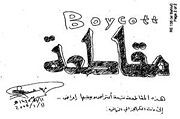
Boycott of Guantanamo Military Commissions
Encyclopedia

Boycott
A boycott is an act of voluntarily abstaining from using, buying, or dealing with a person, organization, or country as an expression of protest, usually for political reasons...
against the judicial hearings was declared by Ali al-Bahlul. The boycott gained momentum in 2008 when more detainees faced Guantanamo military commission
Guantanamo military commission
The Guantanamo military commissions are military tribunals created by the Military Commissions Act of 2006 for prosecuting detainees held in the United States Guantanamo Bay detainment camps.- History :...
s
The boycott has threatened the future of the tribunals, and reduced the credibility of the Military Commissions Act of 2006
Military Commissions Act of 2006
The United States Military Commissions Act of 2006, also known as HR-6166, was an Act of Congress signed by President George W. Bush on October 17, 2006. Drafted in the wake of the Supreme Court's decision on Hamdan v...
as prisoners have resolved not to cooperate or recognise the American military proceedings, amidst claims that the tribunals were not impartial, the detainees had been abused or tortured into giving false confessions, and would find each detainee "Guilty" regardless of the facts. Public confidence in the fairness of the trials reached all-time lows after the boycotts began.
Organised by the detainees themselves, American military defence attorneys have blamed peer pressure
Peer pressure
Peer pressure refers to the influence exerted by a peer group in encouraging a person to change his or her attitudes, values, or behavior in order to conform to group norms. Social groups affected include membership groups, when the individual is "formally" a member , or a social clique...
for convincing other prisoners to join the process.
Six of the charged prisoners have appeared before a judge in 2008, and five of them declared their intentions to boycott the proceedings. The Canadian Omar Khadr
Omar Khadr
Omar Ahmed Khadr is a Canadian child soldier and one of the juveniles held at the Guantanamo Bay detention camp. He was convicted of five charges under the United States Military Commissions Act of 2009 including murder in violation of the law of war and providing material support for terrorism,...
, accused of throwing a grenade when he was 15-years old, is the only detainee facing charges who is not currently boycotting the hearings, as his lawyers have stressed this shows that he is not a threat and will "play by the rules" if released. He was however a former member of the boycott, announcing his intentions to boycott in March 2006.
Detainees facing charges who have joined the boycott
- Ali Hamza Ahmad Sulayman al-Bahlul, accused of making videos glorifying al-Qaeda attacks
- Mohamed JawadMohamed JawadMohamed Jawad, born in Miranshah, Pakistan, was accused of attempted murder before a Guantanamo military commission on charges that he threw a grenade at a passing American convoy on December 17, 2002. Jawad's family says that he was 12 years old at the time of his detention in 2002...
, accused of throwing a grenade when he was 17-years old - Salim Hamdan, accused of acting as a chauffeurChauffeurA chauffeur is a person employed to drive a passenger motor vehicle, especially a luxury vehicle such as a large sedan or limousine.Originally such drivers were always personal servants of the vehicle owner, but now in many cases specialist chauffeur service companies, or individual drivers provide...
to Osama bin LadenOsama bin LadenOsama bin Mohammed bin Awad bin Laden was the founder of the militant Islamist organization Al-Qaeda, the jihadist organization responsible for the September 11 attacks on the United States and numerous other mass-casualty attacks against civilian and military targets...
, announced his boycott April 29 2008 after years of cooperation, stating "America tells the whole world that it has freedom and justice. I do not see that...There are almost 100 detainees here. We do not see any rights. You do not give us the least bit of humanity...Give me a just court...Try me with a just law."

